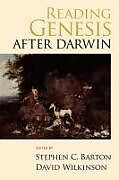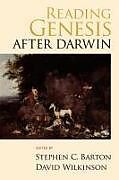Reading Genesis After Darwin
Einband:
Kartonierter Einband
EAN:
9780195383362
Untertitel:
Englisch
Autor:
Stephen C. (EDT) Barton, David (EDT) Wilkinson
Herausgeber:
Oxford University Press
Anzahl Seiten:
270
Erscheinungsdatum:
01.11.2009
ISBN:
0195383362
Zusatztext It's a strange world when science can be used to dismiss the Bible, or when the Bible can be used to reject science - strange because God's people have long affirmed that the world and the Bible comprise God's Two Books. The challenge, then, is how to read the pages of both faithfully and to discern in their coordinated witness the character and aims of God. For its willingness to take up this challenge, and to do so accessibly and sensibly, Reading Genesis after Darwin is a genuinely important book. In their sketches of how Genesis was read before, during, and after the days of Darwin, these authors demonstrate how people might take the natural sciences seriously and continue to turn to Genesis 1-3 as sacred scripture. Informationen zum Autor Stephen Barton: Reader, Department of Theology and Religion, Durham University; David Wilkinson: Principal, St. John's College, Durham University Klappentext Charles Darwin's On the Origin of Species has changed the landscape of religious thought in many ways. There is a widespread assumption that before Darwin, all Christians believed that the world was created some 6,000 years ago over a period of 6 days. After Darwin, the first chapters of Genesis were either rejected totally by skeptics or defended vehemently in scientific creationism. This book tells a very different story. Bringing together contributions from biblical scholars, historians and contemporary theologians, it is demonstrated that both Jewish and Christian scholars read Genesis in a non-literal way long before Darwin. Even during the nineteenth century, there was a wide range of responses from religious believers towards evolution, many of them very positive. Stephen C. Barton and David Wilkinson argue that being receptive to the continuing relevance of Genesis today regarding questions of gender, cosmology, and the environment is a lively option. Zusammenfassung From creationism to The God Delusion, the public dialogue of science and religion either uses the early chapters of Genesis in a naïve and simplistic way or rejects their relevance to contemporary questions. This is reinforced by the myth that Darwin caused a rejection of a literalistic reading of Genesis 1 and from that point most Christian theology lost any confidence in these texts. The truth is far more complex. Jewish and Christian interpretation of the early chapters of Genesis had a long a fruitful history from the earliest times. In the 19th century, many more important issues were at stake than biblical literalism, and there were many different interpretations of how the discoveries of Darwin helped or hindered the reading of the biblical text. Today, theologians are returning to the importance of Genesis as a partner in dialogue with science, gender, and environmental care. As the distinguished authors of the papers in this volume show, far from Darwin burying these ancient texts, he has liberated them to speak in new and different ways. The volume is divided into three parts. In the first, the authors explore how the scriptures themselves were interpreted before the time of Darwin. The fact that non-literal interpretations were standard in early Jewish and Christian thought is often ignored. In fact, these insightful early interpretations have much to teach us today. Part II presents essays on the real history of the Darwin controversies. Exploding the myths about this period, it is fascinating to see how Darwin was welcomed by many religious thinkers. In Part II, the authors apply the insights of Genesis post Darwin to contemporary issues today, such as: what it means to be human, questions of gender, and of evil and environmental care. The final chapter deals with the rise of creationism in its current social context. Inhaltsverzeichnis Acknowledgements Contributors Introduction Stephen C. Barton and David Wilkinson Part 1: Engaging Again With The Scriptures 1.: 'How...
Autorentext
Stephen Barton: Reader, Department of Theology and Religion, Durham University; David Wilkinson: Principal, St. John's College, Durham University
Klappentext
Charles Darwin's On the Origin of Species has changed the landscape of religious thought in many ways. There is a widespread assumption that before Darwin, all Christians believed that the world was created some 6,000 years ago over a period of 6 days. After Darwin, the first chapters of Genesis were either rejected totally by skeptics or defended vehemently in scientific creationism. This book tells a very different story. Bringing together contributions from biblical scholars, historians and contemporary theologians, it is demonstrated that both Jewish and Christian scholars read Genesis in a non-literal way long before Darwin. Even during the nineteenth century, there was a wide range of responses from religious believers towards evolution, many of them very positive. Stephen C. Barton and David Wilkinson argue that being receptive to the continuing relevance of Genesis today regarding questions of gender, cosmology, and the environment is a lively option.
Zusammenfassung
From creationism to The God Delusion, the public dialogue of science and religion either uses the early chapters of Genesis in a naïve and simplistic way or rejects their relevance to contemporary questions. This is reinforced by the myth that Darwin caused a rejection of a literalistic reading of Genesis 1 and from that point most Christian theology lost any confidence in these texts. The truth is far more complex. Jewish and Christian interpretation of the early chapters of Genesis had a long a fruitful history from the earliest times. In the 19th century, many more important issues were at stake than biblical literalism, and there were many different interpretations of how the discoveries of Darwin helped or hindered the reading of the biblical text. Today, theologians are returning to the importance of Genesis as a partner in dialogue with science, gender, and environmental care. As the distinguished authors of the papers in this volume show, far from Darwin burying these ancient texts, he has liberated them to speak in new and different ways. The volume is divided into three parts. In the first, the authors explore how the scriptures themselves were interpreted before the time of Darwin. The fact that non-literal interpretations were standard in early Jewish and Christian thought is often ignored. In fact, these insightful early interpretations have much to teach us today. Part II presents essays on the real history of the Darwin controversies. Exploding the myths about this period, it is fascinating to see how Darwin was welcomed by many religious thinkers. In Part II, the authors apply the insights of Genesis post Darwin to contemporary issues today, such as: what it means to be human, questions of gender, and of evil and environmental care. The final chapter deals with the rise of creationism in its current social context.
Inhalt
Acknowledgements
Contributors
Introduction
Stephen C. Barton and David Wilkinson
Part 1: Engaging Again With The Scriptures
1.: 'How Should One Read The Early Chapters Of Genesis?'
Walter Moberly
2.: 'Genesis Before Darwin: Why Scripture Needed Liberating From Science'
Francis Watson
3.: 'The Six Days Of Creation According To The Greek Fathers'
Andrew Louth
4.: . 'The Hermeneutics Of Reading Genesis After Darwin'
Richard S. Briggs
Part 2: Understanding The History
5.: 'What Difference Did Darwin Make? The Interpretation Of Genesis In The Nineteenth Century'

Leider konnten wir für diesen Artikel keine Preise ermitteln ...
billigbuch.ch sucht jetzt für Sie die besten Angebote ...
Die aktuellen Verkaufspreise von 6 Onlineshops werden in Realtime abgefragt.
Sie können das gewünschte Produkt anschliessend direkt beim Anbieter Ihrer Wahl bestellen.
Loading...
Die aktuellen Verkaufspreise von 6 Onlineshops werden in Realtime abgefragt.
Sie können das gewünschte Produkt anschliessend direkt beim Anbieter Ihrer Wahl bestellen.
| # | Onlineshop | Preis CHF | Versand CHF | Total CHF | ||
|---|---|---|---|---|---|---|
| 1 | Seller | 0.00 | 0.00 | 0.00 |
